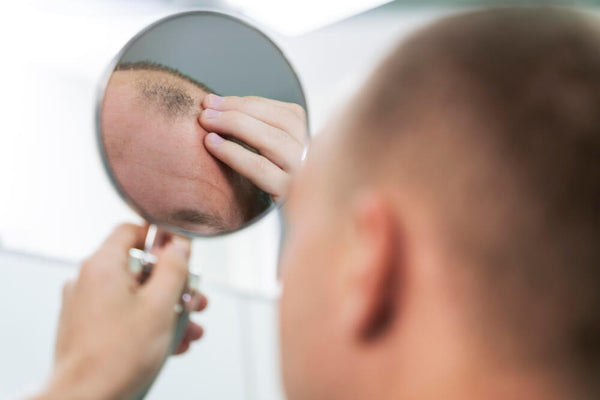Here's a scenario we see all the time: You're eating decently, trying to manage stress, but your hair is still shedding more than it should. It feels fragile, and your scalp might even be tender or inflamed. You’ve swapped your products, but nothing changes.
Sound familiar? What if I told you the culprit might be a silent, widespread deficiency that most doctors don't even check for? We're talking about magnesium. And for us as Black women, whose hair and scalps are already under unique stress, this one mineral can be a total game-changer.
The Magnesium-Hair Connection You Haven't Heard Of
Most people think of magnesium for sleep or cramps, but it's a powerhouse for hair. It's involved in over 700 reactions in your body, and when it's low, your hair is one of the first things to suffer.
Here’s the real deal: magnesium doesn’t just “support” hair growth in a vague way. It tackles two major, specific problems that directly cause hair loss and scalp issues.
1. It Fights Scalp Calcification (The Hidden Hair Choker)
This is the big one nobody talks about. Scalp calcification is a fancy term for when calcium builds up in the blood vessels under your scalp. Think of it like rust building up in a pipe. Those vessels become stiff and can't deliver oxygen and vital nutrients to your hair follicles effectively.
This calcification can also clog the follicles themselves, leading to inflammation, a condition that feels like a sore scalp, and even conditions like folliculitis. Over time, those starved, clogged follicles simply give up and stop producing hair.
Magnesium’s job? It acts as a natural calcium regulator. It helps clear that buildup specifically at the scalp level, restoring blood flow and essentially unclogging the pipeline so nutrients can finally reach your hair again.
2. It’s the Key to Building Strong Hair (Protein Synthesis)
Your hair is made of a protein called keratin. To build that protein, your body needs to follow a precise recipe—a process called protein synthesis. Magnesium is a crucial foreman on that job site. Without enough of it, the entire construction project falls apart. The result? Weak, brittle hair that breaks easily and can't hold onto its length, no matter how gentle you are.

How Do You Know If You're Low On Magnesium? (It's More Common Than You Think)
So, how does someone become magnesium deficient? It’s scarily easy, especially for us.
High-Stress Lifestyles: Stress burns through magnesium like crazy. And let's be honest, who isn't stressed?
Dietary Gaps: Our modern soils are depleted, so even healthy foods might not be as rich in magnesium as they once were.
Underlying Health Issues: Gut problems like Crohn's or Celiac disease can destroy your ability to absorb magnesium, even if you're eating enough.
Common Medications: Things like birth control pills and certain diuretics can flush magnesium right out of your system.
The signs aren't always obvious. Yes, there's hair thinning and shedding. But also pay attention to things like constant muscle tension (especially in your neck and shoulders), trouble sleeping, and that general feeling of being wired but tired. Your body might be sending you signals long before the hair loss becomes severe.
Why Just Eating More Avocados Isn't a Magic Fix
“I’ll just eat more nuts and leafy greens!” Trust me, I wish it were that simple. And while diet is the absolute foundation, here’s why it often isn’t enough when you're already dealing with hair loss:
Your Body is in a Deficit: If you're already deficient, catching up through diet alone is like trying to fill a swimming pool with a teaspoon. The demand is too high.
Absorption is Key: You can eat all the spinach in the world, but if you have a gut issue (which many of us with autoimmune or inflammatory conditions do), you might not be absorbing it properly.
The Form Matters: Not all magnesium supplements are created equal. Some cheap forms are barely absorbed by your body, which is why we only use and recommend medical-grade, highly bioavailable forms.
This is exactly why we're so passionate about functional medicine testing at Nina Ross. We don't guess. We can use specific tests to see what’s happening inside—are your levels truly low? What's your overall mineral balance? Is there an absorption issue? This is how we move: create a targeted, effective plan instead of just blind guesses..
Our Approach: Correcting the Deficiency from the Root
At Nina Ross Hair Therapy, we do not see magnesium as a single solution to all problems. Rather, magnesium is viewed as an essential element that’s crucial to your healthy hair.
First of all, we will evaluate your overall health profile. Your symptoms and history will tell us whether we’ll need further functional lab tests to check your mineral status. This allows us to see the whole map.
After that, we create the optimal treatment plan for you. It won’t just be to simply hand you a supplement pack. It is about:
Targeted Supplementation: Using pharmaceutical-grade nutraceuticals like our Potassium & Magnesium supplement that your body can actually use and absorb.
Address Co-Factors: We look at your Vitamin D and calcium levels, because these work in a delicate dance with magnesium. Fixing one without the others is a recipe for frustration.
Integrate Advanced Therapies: For follicles that have been dormant due to calcification or nutrient deprivation, we will also go with regenerative treatments like PRP or exosome therapy to stimulate regrowth in a better way.
Tired of Treating the Symptoms? Let's Find the Source.
You've probably tried to solve this on your own for long enough. Googling symptoms, buying another supplement, hoping this is the one that works. It's exhausting.
What if you finally had a partner who could connect the dots? Someone who understands that your thin hair, your sore scalp and your constant fatigue might all have the same root cause?
It’s time to start healing. Book a Hair Therapy Evaluation for just $99 with us and we'll create a plan that gives your hair just the support it needs to thrive.















